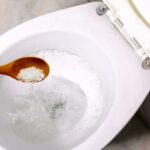One of the simplest and most effective ways to fix an overly salty soup, stew, or braised dish is to add water. Water will dilute the saltiness, but be careful not to boil it down too much, as this will concentrate the salt again.

Raw Potato Method
Potatoes are a well-known salt absorber and are often used to fix salty soups, broths, and stews. Simply peel and cut a large potato into chunks and add it to your dish while it’s simmering. Remove the potato before serving.
Fresh Lemon Juice or Rice Vinegar
Lemon juice is a great way to rescue an oversalted dish while preserving its original flavor. However, if your dish contains dairy products, avoid using lemon juice, as the acid in lemons will cause curdling and make the dish even saltier.

Similarly, rice vinegar can be used to fix salty dishes, except those containing dairy. Just add a teaspoon or two of rice vinegar to your dish, tasting as you go to ensure the flavor is balanced.
Plain Yogurt or Tomatoes
For dishes containing dairy products like cream or cheese, use plain yogurt to increase the acidity and balance out the saltiness. For tomato-based dishes, add thick tomato slices about 15-20 minutes before serving. Tomatoes will absorb some of the salt and help balance the flavors of the dish.
Sweeten with Honey or Sugar
If your dish is too salty, you can counterbalance the saltiness with a touch of sweetness. Honey or sugar are great options to reduce the salty taste and enhance the flavor of your dish.

Egg White Method
For soups and stews, instead of using tomatoes or potatoes, try adding an egg white (from a chicken or duck egg). Simply drop the unbroken egg white into the pot and let it simmer for about 5 minutes before removing it. Adjust the number of egg whites depending on the amount of salt and liquid in your dish.
Using plain, unsweetened yogurt is especially effective for dishes containing cheese, cream, or curry. It helps to reduce the saltiness without altering the flavor profile of the dish.
Tomatoes to the Rescue
If you don’t have lemons, yogurt, or potatoes on hand, try using thick tomato slices. Soak them in your dish for 15-20 minutes before serving. The natural acidity of tomatoes will help neutralize the saltiness. However, this method may not be as effective as using lemon juice or yogurt.
Honey for a Milder Taste
Honey is an excellent natural sweetener that can reduce the saltiness of your dish and enhance its flavor. A small spoonful of honey will do the trick and is generally more effective than using sugar.
The Cloth and Rice Method
You can use a thin cloth or muslin bag to wrap some cooked rice and drop it into your salty soup. The rice will absorb the salt particles, reducing the saltiness of your otherwise delicious soup.
Web design and development expert with over 15 years of experience. I’ve helped hundreds of businesses with their website development strategies, ensuring sustainable growth and profitability.
Why Sprinkle Salt in the Toilet Bowl?
“Many people opt for powerful toilet cleaners without realizing the potential harm they can cause to the enamel. A better and safer alternative is salt, which is highly effective at cleaning toilet bowls without causing any damage. Say goodbye to harsh chemicals and hello to a sparkling clean bathroom with this natural solution!”
3 Long-Lasting Spices in Your Kitchen That Boost Health: Number 1 Tends to Run Out Fast
Eating healthy isn’t just about choosing clean foods, it’s also about knowing when to hold back on the things that silently harm your health and that of your family. So, here are three types of seasonings that, the longer you use them, the more your body will thank you and your blood vessels will silently rejoice:






































